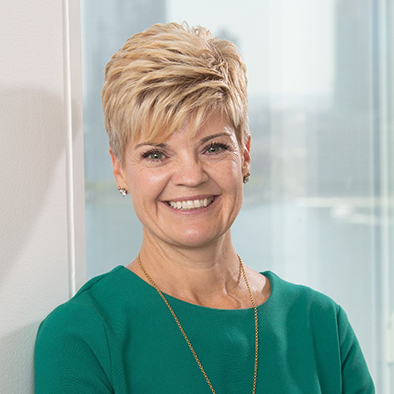Q&A With Samantha Veeder, Chair of the Advancing the Profession Task Force
By Maria Carrasco, NASFAA Staff Reporter
With the Advancing the Profession Task Force beginning its work last month, chair Samantha Veeder, FAAC®, spoke with NASFAA about the task force’s upcoming plans.
The purpose of the Advancing the Profession Task Force is to create a toolkit that financial aid directors can use within their offices to ensure they have a seat at the institutional decision-making level. The task force will also offer suggestions to NASFAA on how such training could be infused into NASFAA’s existing products, services, training, and events and review NASFAA’s Competency Model for use in task force goals.
Samantha is currently the associate dean of college enrollment and director of financial aid at the University of Rochester, an independent consultant with Blue Icon Advisors, and has over 27 years of experience in the financial aid profession. She previously served as director of financial aid at Syracuse University, Nazareth College, and Hobart and William Smith College, and as a senior consultant at Scannell & Kurz, Inc.
Read on to find out more about Samantha’s mission for the Advancing the Profession Task Force.
TN: What is the issue this task force is trying to address?
SV: NASFAA recently surveyed 500 institutions and there was a lot of concern in financial aid offices about their ability to remain administratively capable in the future, and about the future of the profession. Offices are concerned that they are locked out of key decisions on campuses and they don't have a seat at the table. And when decisions are made, sometimes these decisions result in compliance issues and their hands are kind of tied. Our goal is to create a toolkit that financial aid directors can use within their offices to make sure that they do have that seat at the decision-making table.
TN: How will the Advancing the Profession Task Force help current and future aid directors advocate within their campus?
SV: We're hoping to provide them tools to help them make the case on their campus, so tools to help them effectively communicate. I know even for me, financial aid people have a tendency to get in the weeds really easily, and that doesn't help us when we're communicating. Senior leaders don't want to be in the weeds. And so we have to think much more strategically and learn how to communicate differently in order to be effective when making recommendations at a higher level.
We’re hoping to provide tools to help our colleagues in that area. For instance, there have been a lot more requests lately for media interviews, and that is something new for financial aid administrators. So there's some hesitancy in taking on those media requests because we haven't really been trained on how to be a good spokesperson, or how we represent the industry and our campus at the same time. We’d also like to focus on improving professional development so that financial aid administrators can think more strategically. We tend to often be very operational and we need tips on developing ourselves professionally to be more strategic about advancing our profession.
TN: Why did you decide to serve on this task force?
SV: When our 2022-23 National Chair Brad Barnett asked me to chair this task force, it felt right at home for me. Thinking about succession planning and talking about the fact that financial aid administrators do not sit at the strategic decision-making table enough, do not get promoted enough into higher level positions — we see our admissions colleagues in that space much more than we see our financial aid colleagues — that's been something that has concerned me for many years. I'm excited to see that, as a profession, we are finally going to come together and create training and tools for each other to help us break through that glass ceiling and sit at that table on our campuses or get that next level job.
TN: What challenges do you think the task force will face?
SV: Filling vacancies has been incredibly difficult, and keeping people in the profession is so very different than it was 30 years ago, when I joined the profession. A lot of my colleagues who entered when I did, we came from work-study jobs in the financial aid office and turned it into a career. We're seeing less of that excitement about the profession as a whole, and so the challenge is recreating that excitement and building the connections within the community that foster the growth in this profession.
We have to work harder now to rebuild that growth pathway in the profession and foster up from entry-level financial aid administrators who become financial aid leaders and sit in those senior level positions. The challenge for us as a task force is to make sure that we have the right tools and training recommendations to address that challenge that exists in the profession right now.
Publication Date: 11/3/2022






You must be logged in to comment on this page.